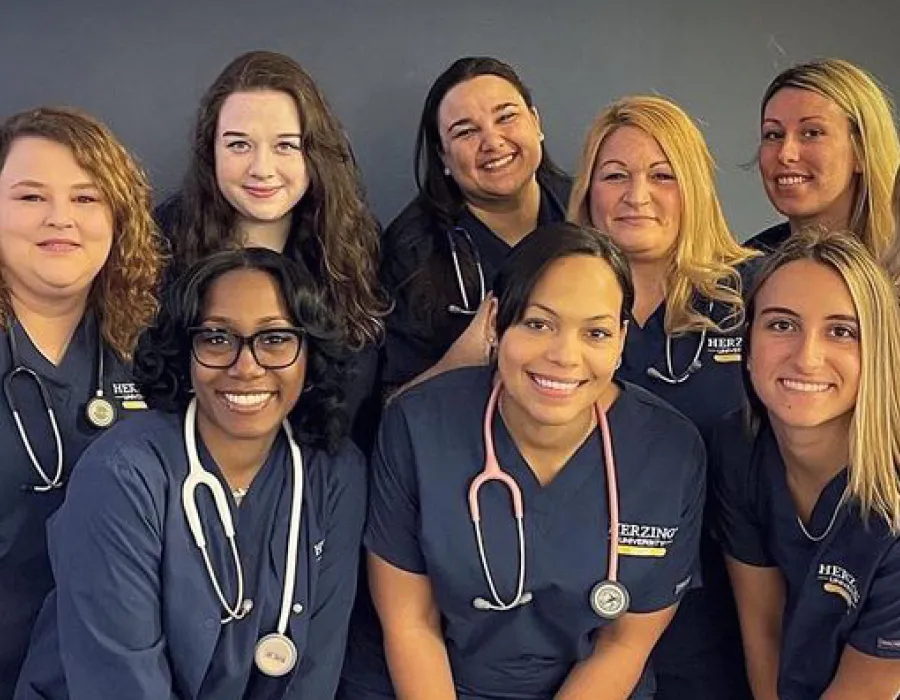Program availability
Your Preferences
Update your Zip code, preferred campus, and preferred program

How to Become a Licensed Practical Nurse (LPN)
What do you need to do to become an LPN? Step 1 is get the education you need in a practical nursing program. That's where Herzing can help.
Begin a rewarding new career path
The Bachelor of Science in Nursing (BSN) is increasingly becoming the new educational standard for today’s nurses. But while many individuals aspire to earn a BSN, you don’t necessarily need a bachelor’s degree to begin your nursing career.
In fact, many people first become a Licensed Practical Nurse (LPN) to gain experience in the field. LPNs are integral members of the healthcare team that work closely with registered nurses (RNs) and physicians to provide patients with basic nursing care. Becoming an LPN is a great way to start your nursing career and can often serve as a stepping stone on the pathway to an associate, bachelor's, master’s, or doctorate degree later on.
Interested in taking the first step towards a career in nursing? Here’s how you can become an LPN in a little as 12 months:
1. Know the role of a practical nurse
Practical nurses play a unique role in nursing and have a specific set of responsibilities differentiating LPN from other types of nurses, such as Certified Nursing Assistants (CNA) and Registered Nurses (RN).
What does an LPN do?
An LPN provides basic nursing care under the supervision of RNs or physicians. Practical nurses can be responsible for a range of duties, including taking vital signs, recording patient histories, and administering medications. Additional duties can include:
- Monitoring patients
- Completing routine assessments, such as checking blood pressure
- Changing bandages and wound care
- Helping patients bathe or dress
- Inserting IVs or catheters
- Ensure patients are comfortable
- Collaborate with RNs and doctors and report patient concerns
Duties may vary depending on the state of employment and healthcare facility (hospitals, nursing care facilities, clinics, and more). For example, some states do not permit LPNs to administer IV drips or medications.
Practical nurses contribute as key members of a healthcare team, supporting doctors and nurses in caring for patients of all ages. The first step to begin developing these skills is to enroll in a practical nursing program.
2. Enroll in a practical nursing program
In order to become an LPN, you must complete a diploma in practical nursing through an approved educational program. These programs typically only take one year to complete and help prospective nurses learn basic nursing skills through a combination of coursework and clinical experiences.
At Herzing University, practical nursing students practice applying their nursing skills in simulation labs and learn from nursing instructors with real healthcare experience. They also gain real-world experience by completing their required clinical work with a variety of local healthcare partners.
“Clinical experience is important to your nursing career because you can explore different areas in the clinical setting. Many times, you find what you like and don't like in clinical and that helps you decide what types of positions you will apply for when you graduate,” said Herzing graduate Shenese Stewart. “It also helps connect the dots between theory and practice. Reading about something and actually doing it can help solidify it in your mind.”
Waived Enrollment Fee
Discover the educational pathway designed to maximize your career potential. Reach for greater heights with Herzing University.
3. Take the NCLEX-PN exam
After graduating with your diploma in practical nursing, you will be eligible to sit for the National Council Licensing Examination for Practical Nurses exam (NCLEX-PN). You must pass this exam to practice as an LPN.
Your nursing courses will help prepare you for the NCLEX, but studying early and often is recommended. Michelle Metzger, Department Chair of Nursing at the Herzing University Kenosha campus, suggests reviewing past exams from class to become more familiar with the types of questions you might encounter on the NCLEX, as well as taking advantage of any test prep resources offered your school.
4. Start your career and keep learning
Once you’ve passed your NCLEX-PN, you’re ready to start your career as an LPN. It's common for nurses to gain nursing experience working as an LPN while they advance their education in an ASN or BSN program.
Herzing’s practical nursing curriculum is designed so that students who wish to advance their nursing education can enroll directly in the Bachelor of Science in Nursing (BSN) program. Graduates of the PN program may be able to choose between several flexible learning options, including an LPN to ASN or BSN pathway.
Open doors to new possibilities as an LPN

"Becoming an LPN as a young mother was one of the most pivotal decisions of my life. It wasn’t just a career move—it was a bridge that opened doors into the world of nursing. It gave me the freedom to explore different specialties, find my true passion, and still prioritize raising and caring for my family.
For you, becoming an LPN can be a powerful steppingstone—a launchpad into further education and advanced roles—or it can be your ultimate, fulfilling destination in nursing. The beauty is that the choice is entirely yours.
My journey started as an LPN and evolved: I earned my ADN, achieved my BSN, pursued my PMHNP, and ultimately completed my DNP. Each step shaped me into the nurse and leader I am today. I wouldn’t change a thing—and neither will you, if you embrace your path with courage and determination."
Dr. Monique Scott DNP, PMHNP-BC
Program Chair - Psychiatric Nurse PractitionerDr. Monique Scott is a Board-certified Psychiatric Nurse Practitioner with over 18 years of combined nursing and advanced practice experience, specializing in child and adolescent psychiatry, chronic mental health disorders, and geriatric psychiatry. She serves as the Program Chair for Herzing University’s PMHNP program, bringing a passion for mentorship and community-based mental health education. An alumna of New York University and Wilkes University, Dr. Scott is committed to preparing future nurse practitioners to provide compassionate, evidence-based care to diverse populations.
Become possible with Herzing University.
The biggest step to take towards becoming a new you is enrolling in a diploma program so you can become licensed to practice in your state. Herzing University offers a practical nursing diploma program at several of our ground campuses:
- Akron, Ohio
- Birmingham, Alabama
- Brookfield, Wisconsin
- Clarksville, Tennessee
- Kenosha, Wisconsin
- Madison, Wisconsin
- Nashville, Tennessee
- Orlando, Florida
- Tampa, Florida
